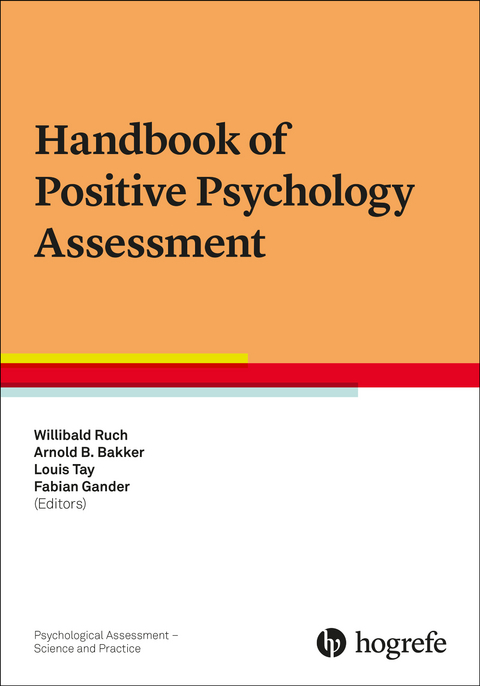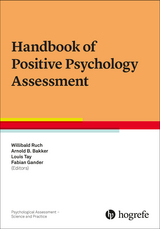Handbook of Positive Psychology Assessment
Hogrefe Publishing (Verlag)
978-0-88937-619-9 (ISBN)
Learn how to select the right positive psychology (PP) assessment tool for the right situation
* Written by internationally renowned authors
* Looks at well-being, traits, states, and behavior
* Presents the relevant psychometric properties
* Considers assessment challenges
* Recommends selection in different settings
* Explores new directions in PP
This volume gives a state-of-the-art overview of assessment in the field of positive psychology, including a comprehensive overview of current theories, approaches, issues, and assessment instruments. In four sections, leading experts look at different conceptualizations of well-being and discuss specific traits, states, and behaviors. New directions in positive psychology are also explored, including measuring primal world beliefs, imagination, self-transcendent experiences, and nostalgia.
Each chapter provides an introductory background to the positive psychology topic at hand, reviews the most relevant assessment instruments, and discusses the specific assessment-related challenges. Recommendations for the selection of assessment tools are included for specific settings, such as school, relationships, health and clinical settings, leisure, and interventions. This book is a must for positive psychology researchers, instructors, students, and practitioners wanting to select the right positive psychology instrument for the right situation.
Willibald Ruch, PhD, is Professor for Personality and Assessment at the University of Zurich, Switzerland, a fellow of the International Positive Psychology Association, and a senior scientist at the VIA Institute on Character in Cincinnati, OH, USA. Arnold B. Bakker, PhD, is Professor of Work and Organizational Psychology at Erasmus University Rotterdam, The Netherlands, a visiting professor at several universities, and a fellow of numerous professional associations. Louis Tay, PhD, is Professor of Industrial-Organizational Psychology at Purdue University, West Lafayette, IN, USA. His research interests cover methodology (i.e., measurement, continuum specification, latent class modeling, Big Data / data science) and well-being. Fabian Gander, PhD, is a postdoc in the Department of Psychology at the University of Basel, Switzerland. He received his PhD from the University of Zurich and he serves as co-editor of the Journal of Happiness Studies.
Part I Introduction
Chapter 1 Introduction
Willibald Ruch, Arnold B. Bakker, Louis
Tay, and Fabian Gander
Part II Well-Being
Chapter 2 Assessing Psychological Flourishing:
A Review of Theory and Instruments
Fanyi Zhang and Louis Tay
Chapter 3 Assessing Subjective Well-Being:
A Review of Common Measures
William Tov, Jun Sheng Keh, Yan Qiang
Tan, Qin Ying Tan, and Indra Alam Syah
Bin Aziz
Chapter 4 Measuring Positive Affect, Positive
Emotions, and Positivity Resonance
Jieni Zhou and Barbara L. Fredrickson
Chapter 5 Health-Related Quality of Life
Stefan Hoefer
Part III Positive Traits, States, and Behaviors
Chapter 6 Assessing Character Strengths
Lisa Wagner and Willibald Ruch
Chapter 7 Assessing Humor and Its Kin
Sonja Heintz and Jennifer Hofmann
Chapter 8 Assessing Playfulness: Current
Challenges and Overview
Rene T. Proyer and Kay Brauer
Chapter 9 Measuring Meaning and Purpose in Life:
A Review and Recommendations
Michael F. Steger and Frank Martela
Chapter 10 Assessing Flow: State of the Art and
Challenges for the Future
Antonella Delle Fave and Marta Bassi
Chapter 11 Self-Efficacy
Ralf Schwarzer and Aleksandra
Luszczynska
Chapter 12 Assessing the Trait of Appreciation of
Beauty
Rhett Diessner
Chapter 13 Assessing Posttraumatic Growth
Sara Etz Mendonca, A. Demaske,
Emma Sims, and Eranda Jayawickreme
Chapter 14 On the Passion Scale: Theory, Research,
and Psychometric Properties
Robert J. Vallerand and Sonia Rahimi
Chapter 15 Work Engagement: A Critical Assessment
of the Concept and Its
Measurement
Wilmar B. Schaufeli and Arnold B.
Bakker
Part IV Applied Settings
Chapter 16 School-Based Approaches for the
Universal Assessment of Adolescent
Psychosocial Strengths
Jennica Paz, Eui Kyung Kim, Erin Dowdy,
Michael J. Furlong, Tameisha Hinton, Jose
A. Piqueras, Tiscar Rodriguez-Jimenez,
Juan C. Marzo, and Susan Coats
Chapter 17 Dyadic Coping as a Concept of Positive
Psychology
Mirjam Senn and Guy Bodenmann
Chapter 18 Health and Clinical Settings
Carmelo Vazquez, Gonzalo Hervas,
Cristian Ochoa, Covadonga Chaves, and
Pablo Roca
Chapter 19 Measuring Leisure: Synopsis of
Perspectives and Instruments
Lynn A. Barnett and Joel A. Blanco
Chapter 20 Monitoring Well-Being Changes in
Positive Psychology Interventions
Fabian Gander
Part V New Directions
Chapter 21 Measuring Primal World Beliefs
Jeremy D. W. Clifton
Chapter 22 Imagination
Darya L. Zabelina
Chapter 23 Assessing Self-Transcendent
Experience
David Bryce Yaden and Marianna
Graziosi
Chapter 24 Measuring Nostalgia
Tim Wildschut and Constantine
Sedikides
| Erscheinungsdatum | 24.10.2022 |
|---|---|
| Reihe/Serie | Psychological Assessment – Science and Practice ; 5 |
| Verlagsort | Toronto |
| Sprache | englisch |
| Maße | 177 x 254 mm |
| Themenwelt | Geisteswissenschaften ► Psychologie ► Allgemeine Psychologie |
| Geisteswissenschaften ► Psychologie ► Test in der Psychologie | |
| ISBN-10 | 0-88937-619-0 / 0889376190 |
| ISBN-13 | 978-0-88937-619-9 / 9780889376199 |
| Zustand | Neuware |
| Haben Sie eine Frage zum Produkt? |
aus dem Bereich




